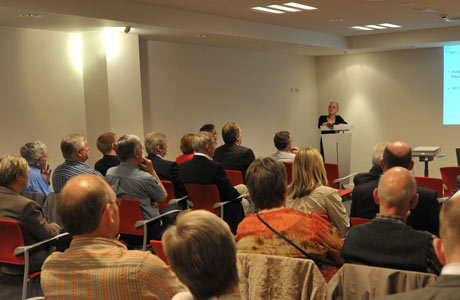2009 European Brass Band Championships - EBBA Conference on Music Education
2-May-2009The EBBA Conference this year highlighted the different approaches to music education in three European coutries. Malcolm Wood was there to find out more.

Full house: Delegates take time to listen...
The opening conference of the European Brass Band Championships provided the opportunity for those in attendance to learn more about music education in Belgium, Holland and Norway respectively.
Key importance?
What was evident from the three presentations by Mrs Jo de Groote from Belgium, Jan Van Den Einden of the Netherlands and Harry Rishaug from Norway was that the provision of musical education in these countries was of paramount importance, even though there were three very distinct ways in which it was being implemented. The costs involved in three diverse economies also varied, but encouragingly, not the commitement.
The Home Nation
Jo de Groote opened the proceedings and talked in depth about the different ways music education in her country was undertaken – linked very clearly to defined aims and objectives. For example, there were a number of part-time Art Schools in Flanders where general music and a variety of instrumental teaching (not forgetting singing) was provided so that students had the opportunity to reach an extremely high standard.
Over 100 music academies in the country focus on what is known as Music, Wordcraft and Dance. Here, aims of artistic training and personal development were vital.
Jo de Groote also talked in detail as to how the different levels of degree education could be obtained. Regardless of which level of degree is being studied, it will take three years to complete with musical tuition being on average around three hours a week.
Budgets
Young or not so old, musical education was encouraged to be taken up by as many people as possible, but everything comes at a cost. Around 180 million Euros per year is spent on musical education - although it should be pointed out that around 90% goes to the educators directly (not to accountants budgets in local authorities to be hived off elsewhere) who pass on their expertise and knowledge.
Discussion Groups
Needless to say, nobody is prepared to stand still and there are lots of discussion groups at both national and local level as to how things can constantly be improved. It was a highly informative and enlightening presentation.
Netherlands
Jan Van Den Einden on behalf of Kunstafactor (an organisation in Holland) gave an honest assessment of where music fits into the educational infrastructure in the Netherlands.
Unfortunately, Mr Van Den Einden made the point that music is currently not a well maintained aspect of the education curriculum, citing that the quality of choral teaching within the educational system was deplorable.
Outside Schools
Taking into consideration that music isn’t high on the Dutch curriculum, it should come as no surprise that the majority of musical knowledge is gained by those wanting to learn outside schools.
That said, the belief remains he said, that music education should be ‘within reach for all who want it’, across the numerous conservatoires and schools which do gain support from local government.
Co-operation
Currently there is a big focus at the moment by the general Government on amateur arts. Here the belief is that co-operation is the key, especially at primary and secondary schools level between the schools and the policy makers. If these objectives can be achieved he said, the overall outlook was brighter than many feel was currently the case.
Norway’s view
After a short comfort break, the final presentation came from Harry Rishaug, a Senior Advisor, and former Director of the Norwegian Council for Schools of Music and Performing Arts.
Those present a year ago recalled EBBA President Ulf Rosenburg’s presentation of how music played such an important part in Norwegian life.
That point was reinforced once again and many countries that are looking to provide music as a pivotal part of education could learn from how it has come about in Norway.
Yes, money helps, but they’re not prepared to stand still and just accept the paycheques. 15% of all children participate in music in some from in primary schools alone with a further 80% of them going on to take music studies at higher levels.
The Norwegian Music Federation is looking to network with other musical associations so they can provide a national conducting qualification too. This would mean that conductors of various musical genres can work within other spheres and gain what would be invaluable experience.
Questions
The forum closed with the opportunity to ask questions and share ideas, with Roy Terry on behalf of Brass Band World enquiring as to whether the three countries that had made presentations had links with ISME – The International Society of Music Education, with only Norway stating that it had links with them.
As always though, the EBBA Forum proved to be an informative couple of hours with those present gaining a greater understanding of the provision of musical education across Europe.
Malcolm Wood















